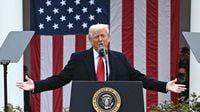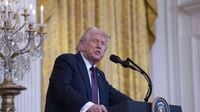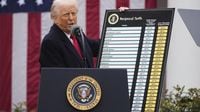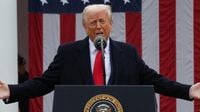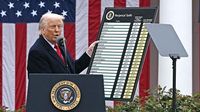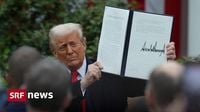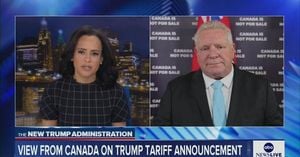On April 2, 2025, U.S. President Donald Trump escalated his aggressive trade policy by proclaiming the day as "Liberation Day" and announcing a sweeping tariff package aimed at foreign goods. This announcement, made in the Rose Garden of the White House, marks a significant intensification of the ongoing trade war between the United States and its global partners, particularly the European Union (EU).
During his address, Trump outlined a strategy that includes a universal tariff of 10% on most imports, with higher rates imposed on countries with which the U.S. has significant trade deficits. The tariffs are set to take effect immediately, as confirmed by Trump's spokesperson, Karoline Leavitt. The president stated, "This day will go down in history as the day American industry was reborn," reflecting his continued belief that such measures will restore the U.S. economy and create jobs.
As part of the tariff package, Trump detailed specific rates for various countries, with the highest tariffs hitting Cambodia at 49%, followed closely by Vietnam at 46%, and Sri Lanka at 44%. Other notable tariffs include 34% on China, 32% on Taiwan and Indonesia, and 31% on Switzerland. The EU will face an average tariff of 20%, a move Trump justified by accusing European nations of unfair trade practices. "They want to sell us their cars but don’t want our products," he said, emphasizing a perceived imbalance in trade relations.
In his speech, Trump also reiterated his administration's commitment to imposing reciprocal tariffs, stating that the U.S. would impose tariffs that are only half as high as those levied by other nations on American goods. For instance, he cited the EU's average tariff of 39% on American products compared to the 20% the U.S. is now imposing.
Trump's announcement has raised concerns among economists and politicians alike. Senator Chris Van Hollen warned that the tariffs could increase costs for average American households by up to $2,000 annually, a prediction that has sparked significant debate about the potential economic impact of these measures. Furthermore, economist Frederic Mishkin indicated that such tariffs could heighten the risk of a recession, as they may lead to increased prices and inflation.
In anticipation of the announcement, the EU has prepared for potential retaliatory tariffs against American products. EU foreign policy official David McAllister stated that the EU would take "intelligent countermeasures" if Trump proceeded with his tariff plans. The fear among many is that this could spiral into a full-blown trade war, with severe consequences for the global economy.
Trump's administration has a history of utilizing tariffs as a primary tool for negotiating trade agreements, and this latest move appears to be no different. By targeting countries deemed unfair in their trade practices, Trump aims to leverage tariffs to foster negotiations that could lead to more favorable terms for American industries.
Critics of Trump's tariff strategy argue that it disproportionately affects American consumers and businesses, particularly in sectors reliant on imported goods. The automotive industry, for example, is bracing for the impact of a 25% tariff on all foreign-made cars, set to take effect from midnight on April 3, 2025. This could have dire consequences for both U.S. consumers and the automotive market, particularly as manufacturers may pass on the increased costs to buyers.
In light of these developments, the German government has expressed a willingness to engage in negotiations regarding the tariffs. Government spokesperson Steffen Hebestreit stated, "We are willing and ready to negotiate at the European level," indicating a desire to find a resolution that prioritizes long-term economic interests while adhering to international trade laws.
As the implications of Trump's "Liberation Day" unfold, the global community watches closely. The International Chamber of Commerce (ICC) has warned that the scope of the tariff increases could jeopardize the global trading system, potentially exposing over $1.6 billion in American exports to retaliatory measures. ICC Secretary-General John Denton highlighted that the extent of Trump's tariff increases surpasses the infamous Smoot-Hawley Act of 1930, which is often cited as a catalyst for the Great Depression.
While Trump views these tariffs as a means to reclaim American economic strength, many experts caution that the fallout could lead to significant economic disruptions both domestically and internationally. The balance of trade, inflation, and consumer prices are all at stake as the U.S. enters this new phase of trade policy.
As Trump continues to push his agenda, the potential for a protracted trade conflict looms large. The stakes are high, and the outcomes uncertain, as both the U.S. and its trading partners navigate this turbulent economic landscape.
In summary, the events of April 2, 2025, will likely be remembered as a pivotal moment in U.S. trade policy, with far-reaching implications for the economy and international relations. The coming days and weeks will reveal how countries respond to Trump's aggressive tariff strategy and what it means for the future of global trade.
